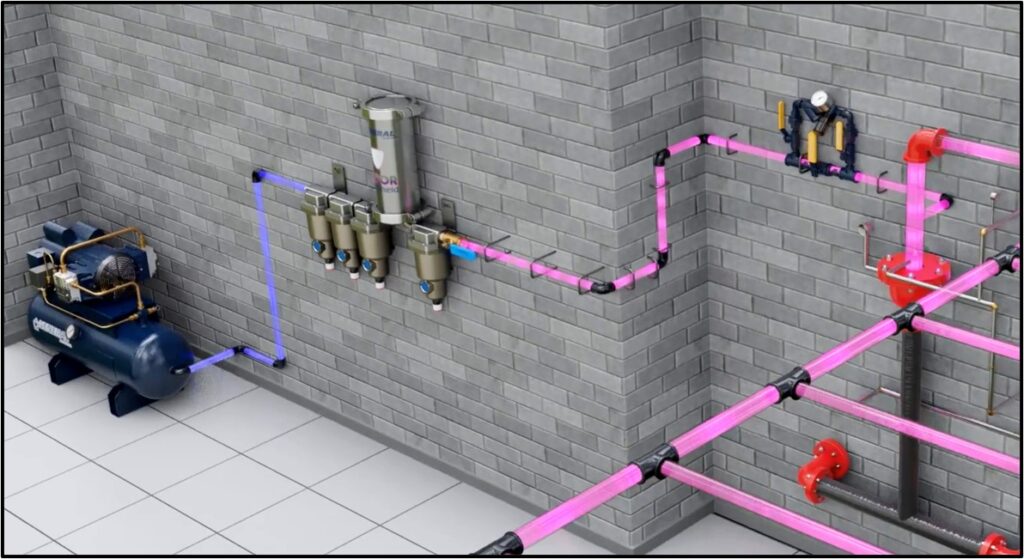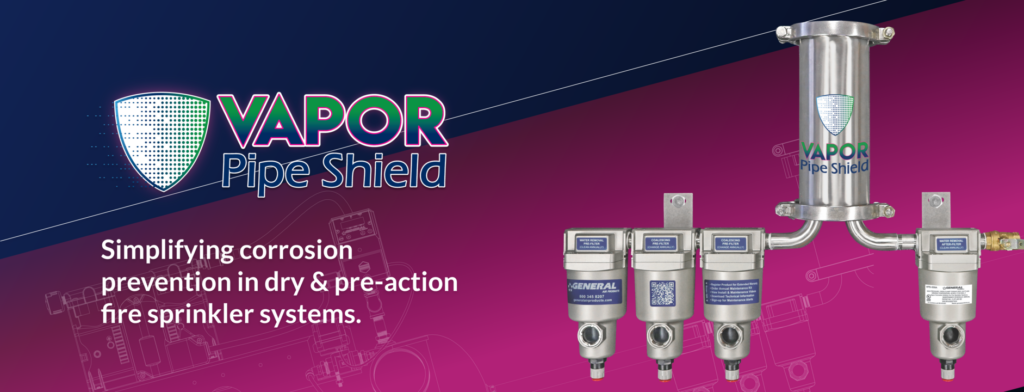The Fire Protection industry is constantly evolving to address new challenges and incorporate the latest advancements in technology. One of the most significant upcoming changes is the 2025 edition of NFPA 13: Standard for the Installation of Sprinkler Systems. This update includes critical language that acknowledges Vapor Corrosion Inhibitors (VCIs) as a viable and effective means of corrosion prevention, placing them on par with nitrogen generator systems. For industry professionals and system designers, these changes signal a significant shift in how corrosion mitigation is approached.
Below, we break down the relevant sections of the new NFPA 13 Standard and provide insights into what these changes mean for the industry.

Key Sections of the NFPA 13 (2025) Update
1. Pipe Friction Loss and the Hazen-Williams C-Factor
- 28.2.4.8.1
This section outlines how pipe friction loss should be calculated using the Hazen-Williams formula, a crucial aspect of sprinkler system design. Traditionally, the C-factor, which indicates the smoothness of the pipe’s interior, has been set at a value that often accounts for some level of corrosion. However, the 2025 edition introduces an important change: - “(16) In new systems, an increased C value of 120 shall be permitted where a vapor corrosion inhibitor is provided in accordance with 8.2.11.”
This change allows systems utilizing a VCI to be designed with a higher C-factor, indicating smoother pipes with reduced friction losses. This adjustment not only validates the effectiveness of VCIs in maintaining pipe integrity but also provides substantial cost-saving benefits in system design. Traditionally, bottled, high-purity nitrogen and on-site nitrogen generators have been afforded this same advantage.
General Air Products sees this as a major advancement for the industry. By equating VCI technology with nitrogen in terms of its ability to maintain pipe smoothness, NFPA 13 is recognizing the effectiveness of VCIs in preserving the long-term performance of sprinkler systems. This not only helps in optimizing system design but also underscores the trust that the industry is placing in VCI technology.
2. Requirements for Vapor Corrosion Inhibitors
- 8.2.11 Vapor Corrosion Inhibitor
This section outlines the specific requirements for incorporating VCIs into sprinkler systems:- 8.2.11.1: “The vapor corrosion inhibitor shall be from a listed assembly permanently installed in accordance with the manufacturer’s instructions.”
- 8.2.11.2: “The vapor corrosion inhibitor equipment shall be maintained in accordance with Chapter 32 and manufacturer’s instructions.
- “8.2.11.3: “A means of verifying vapor concentration shall be provided for each system.”

3. Corrosion Mitigation Options
- 16.4.2.5
This section addresses what actions should be taken when conditions are known to contribute to unusual corrosive properties in a sprinkler system:- (5): “Fill dry-pipe or preaction systems with at least 98 percent pure nitrogen in lieu of air to mitigate against corrosion.”
- (6): “Use a listed nitrogen generator that is sized and installed in accordance with the manufacturer’s instructions.”
- (7): “Use a listed vapor corrosion inhibitor delivery system sized and installed in accordance with the manufacturer’s instructions.”
The inclusion of VCIs as a recognized corrosion mitigation method is a significant endorsement of the technology. General Air Products sees this as an opportunity for the industry to diversify its approach to corrosion control, offering a solution that is not only effective but also often simpler to install and maintain compared to nitrogen systems.
4. Definition and Scope of Vapor Corrosion Inhibitors
- 3.3.242 Vapor Corrosion Inhibitor (VCI)
“A chemical compound (substance) that emits rust-inhibiting vapor to protect ferrous and nonferrous metals against corrosion in air-filled dry pipe or preaction sprinkler systems.”- A.3.3.242
The annex expands on this definition, explaining that VCIs create a thin protective layer through adsorption, which separates the pipe from air or water, providing comprehensive corrosion protection. It also highlights the versatility of VCIs in different environments, including partially aqueous and fully aqueous conditions.
By clearly defining VCIs and their protective mechanisms, NFPA 13 is helping to bring clarity to this technology for those who may be less familiar with it. - A.3.3.242

What This Means for the Industry
The 2025 edition of NFPA 13 represents a significant step forward in how the fire protection industry approaches corrosion mitigation. By recognizing Vapor Corrosion Inhibitors as an equivalent option to nitrogen generators, the Standard provides more tools for fire protection professionals to design robust, long-lasting sprinkler systems. As the Fire Protection industry continues to evolve, VCIs offer a promising path forward, providing effective corrosion protection with the added benefits of easier installation, lower maintenance, and significant cost savings.
As the 2025 NFPA 13 Standard rolls out, General Air Products is committed to helping the industry understand and implement these new guidelines, ensuring that every sprinkler system is as effective and reliable as possible. Whether you’re designing a new system or retrofitting an existing one, Vapor Corrosion Inhibitors offer a proven, reliable solution that is now fully recognized by NFPA 13.
Learn more about the only Vapor Corrosion Inhibitor Deliver System for Dry & Pre-Action Systems on the Market in Vapor Pipe Shield with our latest Webinar or Get a Quote for your next project, click below!